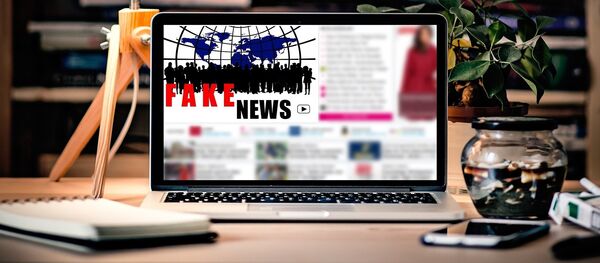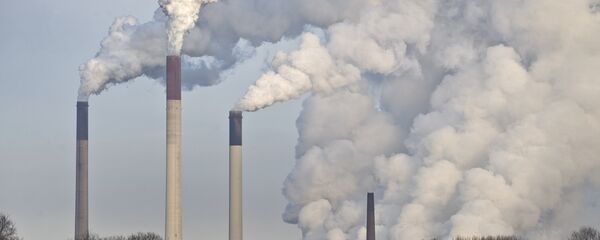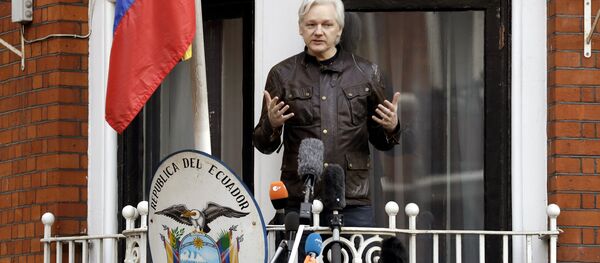They regularly issue "media alerts", offering analysis on major global events and issues, seeking to draw attention to the misleading "limits" within which corporate media operates. They also frequently challenge the journalists and organisations involved, and urge their readers to do the same. Despite being a two-man team whose work has rarely been acknowledged in the mainstream, over the course of its existence the organisation has proven itself to a most troublesome media antagonist.
The pair have also authored books — their latest, "Propaganda Blitz", is the result of 25 years spent watching corporate media "trash literally every major issue they touch", "consistently and systematically attacking even minor threats to the status quo at home and abroad". In this exclusive interview, they share with me their key findings.
What inspired you to write the book?
"Propaganda Blitz" is the result of 25 years spent watching how corporate media trash literally every major issue they touch. They don't just distort, hype, or "sex up"; they reverse the truth, render issues completely impossible to understand, and ignore the most important facts, arguments, and voices. It's an awesomely effective form of thought control, all happening in the absence of any controlling conspiracy.
"It is difficult to get a man to understand something when his salary depends upon his not understanding it."
This is a key issue for understanding corporate media conformity, mendacity, and destructiveness, and it's rooted in the human capacity for self-deception.
The idea of the "propaganda blitz" was formulated by David Edwards after noticing how, time and again, media storms erupted at fortuitous times in support of establishment policy on Iraq, Libya, and Syria, and then in attacking Jeremy Corbyn.
It was obvious in 2013, for example, the BBC was being used as a conduit to peddle relentless atrocity stories in support of "intervention" in Syria. It was clear some kind of mechanism was in place to ensure a steady supply of these claims intended to culminate in a major Western attack. Many of these claims were based on allegations of dramatic new evidence that, we were told, demanded Western "intervention".
The claims are typically characterised by extreme moral dissonance — the public was told "we" — the great humanitarians who wreaked havoc on Afghanistan, Iraq and Libya — were best placed to "save" Syrians from Assad. Anyone daring to challenge this "consensus" was condemned as "pro-Assad", an "Assad apologist", a "denier", and so on. The claims often appeared at just the right time in support of action of some kind and dried up the moment "action" happened or was rejected. When Obama decided not to bomb Syria at the last moment in August 2013, it was very noticeable that the flood of atrocity stories suddenly dried up.
Taken together, the characteristics outlined above are the key features of what we call a "propaganda blitz" — a lightning strike of smears and deception intended to achieve some kind of decisive result benefiting powerful interests.
How does the mainstream media "reverse reality"?
Western states that have been mercilessly plundering the world for hundreds of years are the "good guys". Independent nationalists defending themselves against the "good guys" in places like Iran under Musaddiq, Nicaragua under the Sandinistas and Cuba under Castro become the "bad guys" and even a "threat" to the superpowers attacking them.

What are some major case studies in the book?
At the start, we set out the "anatomy of a propaganda blitz"; in other words, its characteristic features, and then proceed to give examples of corporate and political attempts to destroy Jeremy Corbyn and smear Julian Assange, Russell Brand and Hugo Chavez.
For instance, the issue of anti-Semitism has been "weaponized" cynically and deliberately to attack Corbyn. But, in the wider picture, it is being exploited by the Israel lobby and their influential, privileged supporters in the "mainstream" media to fend off increasing international condemnation of Israel's war crimes and brutal oppression against the Palestinians. Whenever Israel launches yet another show of force against Gaza, a propaganda blitz will then attempt to reinforce the conventional narrative that Israel is only "responding" to Palestinian "aggression".
Other examples of propaganda blitzes include the incessant corporate mantra of a "failing" National Health Service that needs to be "saved" by restructuring it and selling it off to private interests. Another example was the establishment frenzy about the "dangers" of Scottish independence in 2014. This was a remarkable example of the British establishment genuinely in fear of losing its grip on power, and scaremongering the population into supporting the status quo.
The final chapter demolishes the fakery around the issue of "fake news" and proposes a new model of doing journalism that is free of the corporate stranglehold.
Why are mainstream journalists so averse to your work?
We put them in an impossible situation. Take The Guardian's best-known progressive commentators, Owen Jones and George Monbiot — they're famous for their supposedly no-holds barred commentary as left and green dissidents, but there's a problem. Jones, for example, has admitted he's "barred" from criticising his Guardian colleagues in his column. So, when he damns the state of the modern mass media, as he occasionally does, he can't criticise Guardian journalists, editors and managers — he can't dish the dirt on his employer.
It was noticeable in his book, "The Establishment", Jones focused heavily on the problem of media moguls but ignored the Herman and Chomsky "propaganda model" of media control. This was significant because The Guardian isn't owned by a media mogul — which means, happily, it fell outside the focus of Jones's criticism — whereas the "propaganda model" lists media moguls as only one of five key forces filtering media content, with four of those five applying perfectly to The Guardian.
— Media Lens (@medialens) January 23, 2019
Even the remaining filter — of elite ownership — applies. Many readers likely still believe that The Guardian is owned by a non-profit entity called the Scott Trust. In fact, the Trust was wound up in 2008 and replaced by a limited company, which appoints a board comprised of an elite group of individuals with links to banking, insurance, advertising, multinational consumer goods, telecommunications, information technology, venture investment, corporate media, marketing services, and other sectors of the establishment.
So The Guardian is filtered, is part of the problem; it also serves power, but Jones can't discuss that openly. Nor can Monbiot. It's hardly a surprise — no employer holding down a much-prized job within a major corporation is allowed to criticise the company and its product in front of customers. It's understood that this will not be tolerated. Chomsky made the broader point well:
"The chairman of the board may sincerely believe that his every waking moment is dedicated to serving human needs. Were he to act on these delusions instead of pursuing profit and market share, he would no longer be chairman of the board."
— Expressive Egg (@expressiveegg) January 14, 2019
Our point is not to condemn the likes of Jones and Monbiot, or to say they should necessarily self-destruct by attempting to speak out on The Guardian in The Guardian. Our point is it is ridiculous to look for honest media analysis from corporate employees, and if they can't do honest media analysis then their analysis as a whole is basically worthless. No key contemporary issue can be understood, much less addressed, without a genuinely honest, in-depth analysis of the role of state-corporate propaganda in manipulating the truth and deceiving the public.
Why should people be more concerned about liberal than right-wing media?
The liberal media are more important to focus on because nobody expects The Times, Telegraph or Daily Mail to set limits on thinkable thought to the left of the media "spectrum". The Tory press set the limits on the extent to which racism, warmongering and open class war are acceptable in the "mainstream". On the other hand, liberal media set the limits on what level of anti-corporate, pacifistic, socialistic and compassionate ideas are acceptable.
So obviously, we don't ask: "Does The Times publish Noam Chomsky's most excoriating critiques of Western power?" Rather, we ask that of The Guardian. If it doesn't appear there, it's not appearing anywhere. If it's not appearing anywhere, then we don't have a "free press", which is a problem. Then we can decide if that's important, or not. We think the limits on free speech have had disastrous consequences for our own society and of course for societies like Iraq, Libya, Syria, and Yemen.
The consequences could even be totally catastrophic for human life. Global carbon emissions reached a new high in 2018. UK Met Office scientist Peter Stott recently issued a deadly warning: "Humanity just won't be able to cope with the world we are heading for".
"The basic principle, rarely violated, is that what conflicts with the requirements of power and privilege does not exist".
With climate change, we are beginning to appreciate the real significance and full, appalling cost of this truth.
Are there any "voices of reason" in the media? Are there are "false friends" people should watch out for?
There are some comparatively honest voices: Peter Oborne is very limited in what he is willing to say but manages to include some truth on foreign policy and Corbyn. Robert Fisk is better than most on foreign policy, but still talks nonsense about the "independence" and professionalism of his own newspaper, The Independent. He's also been contemptuous of social media activism, which he dismisses as "blog-o-bots". Surprisingly, Peter Hitchens is a dissenting voice on Syria in the awful Mail on Sunday, while being about as foolish as it's possible to be on climate collapse. John Pilger remains the finest political journalist of our time, and it is certainly a sign of these times no UK corporate newspaper or magazine is now willing to publish his column.
"False friends" are likely to be anyone working for corporate media — they simply have to compromise. These would include Jones, Monbiot, Paul Mason, Mehdi Hasan, all of these ambitious characters willing to compromise for a place in the spotlight.
— Media Lens (@medialens) April 8, 2017
No-one should be beyond challenge. We recently discussed former Guardian journalist Glenn Greenwald's outrageous assertion in a tweet that, the issue of Julian Assange aside, The Guardian was "otherwise solid and reliable". We would guess he didn't expect anyone to notice the tweet, but we did. When Greenwald finally replied to our media alert, it wasn't clear that he'd actually read it — maybe he glanced through it in a couple of minutes. He backed off from his original claim, saying that The Guardian did some really good journalism and some terrible journalism (a very different assertion), but he continued to soft pedal his criticism.
At around the same time, he sent a video tribute to Noam Chomsky on his 90th birthday. But actually the best tribute would be to emulate Chomsky by speaking out honestly on the appalling record of The Guardian, which is anything but "solid and reliable". Recall that in 2005, Chomsky described The Guardian's treatment of him in a published interview as "a very impressive effort, which obviously took careful planning and work, to construct an exercise in defamation that is a model of the genre".
What can people do to support your work?
We live in a culture that places high value on cost — people are impressed by a Rolls Royce, a Rolex, or an iPhone precisely because they're so expensive. Similarly, it's very easy to undervalue free stuff — if it's free, it must be worthless. So we were really amazed when people started sending us donations, often without our asking. In fact, the response has been amazing. Last year, in lieu of the usual coffee-makers and cutlery, a couple wrote to their entire list of wedding guests asking them to send donations to Media Lens. As a birthday present for her husband, the wife of an avid reader in Switzerland sent us €1,000, asking only that we send him an email on the day.
In terms of other kinds of support, it has been wonderful to see all kinds of websites, blogs and individual activists springing up that are doing similar work. When we started, very few people thought it was a good idea to challenge The Guardian, for example. Now, a lot of people understand that the better liberal press has been keeping a lid on thinkable thought, on the limits of what is permissible and possible. That has already had impacts in helping Corbyn defy what would otherwise surely have been a fatal smear campaign. The best kind of support is to challenge corporate media as we are doing — write to journalists, tweet journalists, write about their work and their replies.
*Daesh (aka Islamic state/ISIS/IS/ISIL) is a terrorist group banned in Russia





